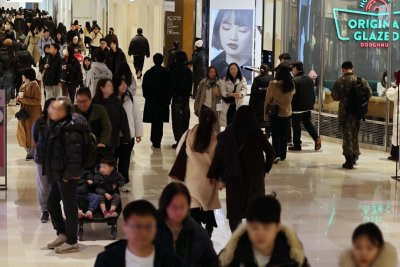Online shopping tops $188B as Korea’s retail divide widens

People crowd an indoor shopping mall in South Korea on 25 January 2026. Photo by YONHAP / EPA
Feb. 2 (Asia Today) — South Korea’s online shopping market surpassed 270 trillion won (about $188 billion) in 2025, hitting a record high and underscoring a growing divide between fast-growing digital platforms and stagnant offline retailers.
According to the “December 2025 and Annual Online Shopping Trends” released Monday by the National Data Service, online shopping transactions reached 272.3 trillion won (about $188 billion), up 4.9% from a year earlier. Mobile shopping accounted for 211.1 trillion won (about $145 billion), a 6.5% increase. Both figures were the highest since data collection began.
Online shopping growth has been fueled by the rapid expansion of mobile consumption and logistics innovations such as early-morning and same-day delivery. Transaction volumes rose from 94.1 trillion won (about $64.9 billion) in 2017 to more than 100 trillion won (about $68.9 billion) the following year, exceeded 200 trillion won (about $137.7 billion) in 2022 and continued climbing steadily into the 270-trillion-won range (about $188 billion) last year.
The strongest growth came from automobiles and auto-related products, which posted annual transactions of 7.5 trillion won (about $5.22 billion), up 30.5% year-on-year. The increase was driven largely by online sales of electric vehicles, particularly from Tesla, which operates a direct online ordering system. Tesla’s domestic sales reached 59,916 units in 2025, more than double the previous year’s total.
Food-related categories also expanded sharply. Online food service transactions rose 12.2% to 41.4 trillion won (about $28.6 billion), while online food and beverage purchases increased 9.5% to 37.8 trillion won (about $26.0 billion), reflecting consumers’ growing reliance on delivery platforms.
By contrast, offline retail channels showed little momentum. Data from the Ministry of Trade, Industry and Energy showed that sales at 26 major retailers rose 6.8% in 2025, but growth was heavily skewed toward online platforms. Online retail sales jumped 11.8%, while offline sales edged up just 0.4%.
Large supermarkets saw sales fall 4.2% from a year earlier, while convenience store sales grew only 0.1%, effectively stagnating. These sectors, closely tied to everyday household consumption, were hit hardest as shoppers shifted spending online.
Industry analysts attribute the decline to the rapid spread of mobile shopping and fast delivery services, which have reduced foot traffic and average transaction values at brick-and-mortar stores. The traditional “one-stop shopping” advantage of large supermarkets has weakened, while convenience stores have lost their proximity edge to quick-commerce and delivery platforms.
Rising fixed costs, including rent, labor and electricity, combined with weaker consumer demand amid high interest rates and inflation, are further eroding profitability. As a result, the gap between online and offline retail is increasingly seen as a structural shift rather than a temporary trend.
— Reported by Asia Today; translated by UPI
© Asia Today. Unauthorized reproduction or redistribution prohibited.
Original Korean report: https://www.asiatoday.co.kr/kn/view.php?key=20260202010000592
